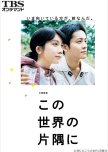In This Corner of MyDramaList
A few months ago, I watched the animated adaptation of the manga 'In This Corner of the World,' and I was certainly impressed. I didn't expect much more than another film about WWII in Japan, but it turned out to be quite different. I enjoyed it so much that I ended up buying a double volume of the original work by Fumiyo Kouno. I also checked out the voices behind each character. The protagonist, Suzu, was voiced by Rena Nōnen, who also voiced Haru in the stop-motion series 'Pokemon Concierge.' This girl, who also participates in dubbing sporadically, is an actress; in fact, she starred in one of the most successful asadoras of the past decade: ‘Amachan’ (2013). Amachan was a total discovery, and in less than a couple of weeks, I had already said goodbye to Aki Amano. Depressed by the existential void that drama caused in me, I was checking this website’s lists until I stumbled upon the live-action adaptation of In This Corner of the World. The circle had closed.
The story of In This Corner of the World, in its nine episodes, takes us to Hiroshima, yet not the Hiroshima from 1945, but to the prefecture nowadays. This is one of the main differences regarding the original work, as the footage has been extended and new scenes have been added that fit perfectly with what has already been told. Kayo, a young girl tired of her current life, decides to move to the coastal city of Kure, where previously she had met up with an elderly woman who had helped her dispel the doubts and fears that usually tormented her. This woman, Setsuko, stokes Kayo’s inner flame through stories from her mother, Suzu-san. In the house at the top of the slope, where Suzu did her daily chores, Kayo fantasizes about the life during that time. In this way, memories of that period are evoked—some heartwarming, while others are of deep pain.
The life of Suzu-san, throughout the episodes, is divided into a first stage which covers her childhood and first days of her arranged marriage with her husband, Shusaku, in Hojo’s residence, until the end of war roughest events, including, obviously, the devastation and consequences caused by atomic bombs. But the main difference, not only comparingly with Western war-themed cinema, but also in relation with other films that narrate the experience from the perspective of the weaker, which is the case in ‘Firefly Graveyard’ (1988), is the idea of family bond and emotional values joined in the most absolute daily life, something that is inherently Japanese. So, the calmly days and sugar caramels will give way to grayer days and meager meals. But, independently of the events, the series reinforce the day-to-day idea of Suzu, her friends and family, in the most humble and human possible way. They were, after all, ignorant of the dimensions of what was coming in their way. Suzu is the representative of that innocence, kindness and naivety, values that little by little will crumble in the face of the cruelty to which the innocent and unaware people are subjected.
The adaptation, regard the source material, is a 1:1 copy, but adds the real component that only real people can convey. Honoka Matsumoto as Suzu is in a similar level to Non’s animated Suzu. I consider this the definitive and most satisfying version of this story, as well as featuring the music of young and unknown composer… Yeah, Joe Hisaishi.
Artifice and spectacularity are not needed to touch the heart, and this story demonstrates with great subtlety, respect, and care how to reach that corner of the world we call home.
The story of In This Corner of the World, in its nine episodes, takes us to Hiroshima, yet not the Hiroshima from 1945, but to the prefecture nowadays. This is one of the main differences regarding the original work, as the footage has been extended and new scenes have been added that fit perfectly with what has already been told. Kayo, a young girl tired of her current life, decides to move to the coastal city of Kure, where previously she had met up with an elderly woman who had helped her dispel the doubts and fears that usually tormented her. This woman, Setsuko, stokes Kayo’s inner flame through stories from her mother, Suzu-san. In the house at the top of the slope, where Suzu did her daily chores, Kayo fantasizes about the life during that time. In this way, memories of that period are evoked—some heartwarming, while others are of deep pain.
The life of Suzu-san, throughout the episodes, is divided into a first stage which covers her childhood and first days of her arranged marriage with her husband, Shusaku, in Hojo’s residence, until the end of war roughest events, including, obviously, the devastation and consequences caused by atomic bombs. But the main difference, not only comparingly with Western war-themed cinema, but also in relation with other films that narrate the experience from the perspective of the weaker, which is the case in ‘Firefly Graveyard’ (1988), is the idea of family bond and emotional values joined in the most absolute daily life, something that is inherently Japanese. So, the calmly days and sugar caramels will give way to grayer days and meager meals. But, independently of the events, the series reinforce the day-to-day idea of Suzu, her friends and family, in the most humble and human possible way. They were, after all, ignorant of the dimensions of what was coming in their way. Suzu is the representative of that innocence, kindness and naivety, values that little by little will crumble in the face of the cruelty to which the innocent and unaware people are subjected.
The adaptation, regard the source material, is a 1:1 copy, but adds the real component that only real people can convey. Honoka Matsumoto as Suzu is in a similar level to Non’s animated Suzu. I consider this the definitive and most satisfying version of this story, as well as featuring the music of young and unknown composer… Yeah, Joe Hisaishi.
Artifice and spectacularity are not needed to touch the heart, and this story demonstrates with great subtlety, respect, and care how to reach that corner of the world we call home.
Questa recensione ti è stata utile?



















